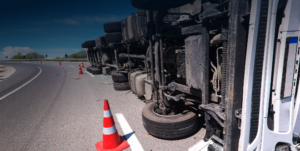Rankings.io | Uncategorized | October 26, 2025

Losing a loved one in a truck accident changes everything. One moment they’re on their way to work or running errands, and the next, they’re gone because a commercial truck crossed the centerline or failed to stop. The grief can feel all-consuming, and figuring out what to do next can make an already painful time even more difficult.
When a commercial truck driver causes a fatal crash on Georgia’s highways, several legal matters begin at once. Criminal investigations, wrongful death claims, and insurance disputes all move forward while your family is still trying to cope with the loss. Knowing what to expect after a fatal truck accident helps you protect your family’s rights while you take time to grieve.
If you’ve lost a loved one in a truck crash in Atlanta, Savannah, or anywhere in Georgia, reach out to a fatal truck accident lawyer at Hasner Law. Our team offers guidance with compassion and experience. Call 678-888-HURT (4878) today for a free consultation.
Key Takeaways About Georgia Fatal Truck Accidents
- Georgia law allows certain family members to file wrongful death claims seeking compensation for the full value of the deceased person’s life, including economic and non-economic losses.
- Fatal truck accidents trigger both criminal investigations by law enforcement and civil lawsuits by the victim’s family, which proceed on separate tracks.
- Trucking companies often send response teams to crash scenes right away to gather evidence for their defense, which makes early legal help especially important.
- Georgia’s two-year statute of limitations for wrongful death claims means families must act within this timeframe or lose their right to pursue compensation.
Georgia’s Wrongful Death Law and Who Can File Claims
Georgia’s wrongful death statute appears in O.C.G.A. § 51-4-2 and grants specific family members the right to pursue claims. The law sets out who has the first right to file a claim. It is important to understand this order because only certain family members are legally allowed to file a wrongful death claim.

The surviving spouse has the first right to file a wrongful death claim in Georgia. If the deceased person was married at the time of death, the spouse becomes the primary claimant.
If there are also surviving children, they share equally with the surviving spouse in any recovery. This means a surviving spouse with two children receives one-third of the wrongful death recovery.
When no spouse survives, the deceased person’s children have the next right to file. All children share equally in any compensation recovered. If one child files the lawsuit, it is done on behalf of all the siblings. Adult children have the same rights as minor children under Georgia’s wrongful death law.
When Parents or the Estate Can File a Wrongful Death Claim in Georgia
If the deceased person had no surviving spouse or children, the parents gain the right to file. Both parents typically share equally in any recovery. When no spouse, children, or parents survive, the administrator or executor of the deceased person’s estate may file the wrongful death claim on behalf of the estate.
Georgia law treats wrongful death claims differently than other types of lawsuits. The damages sought belong to the deceased person’s estate and the surviving family members, not to the person who files the lawsuit. This distinction matters for how courts distribute any settlement or verdict.
What Damages Georgia Law Allows in Fatal Truck Accident Cases
Wrongful death damages in Georgia aim to compensate for the full value of the deceased person’s life. O.C.G.A. § 51-4-1 allows recovery for both economic and non-economic losses. Calculating these damages requires thorough analysis of the deceased person’s life, relationships, and earning potential.
Economic damages include the income the person would have earned from the time of death through their expected working life. Economists often testify about lifetime earnings projections based on the person’s age, education, occupation, and career trajectory. Lost benefits like health insurance, retirement contributions, and other employment perks factor into this calculation.
Non-economic damages reflect the personal value of the person’s life, including their love, companionship, and guidance. This includes the deceased person’s relationships with family members, their role in the household, their companionship, and the guidance they would have provided.
Georgia law doesn’t put a cap on these damages, allowing juries to determine appropriate compensation based on the evidence.
Funeral Costs Pain and Punitive Damages in Georgia Truck Accident Cases
The estate may also pursue a separate claim for medical expenses incurred before death and funeral costs. These expenses get added to the wrongful death recovery.
If the deceased person survived for any period after the accident and experienced pain and suffering, the estate might also truck accident claim damages for that pre-death pain through a survival action.
Punitive damages may be available through the estate’s survival claim when the defendant’s conduct was willful, wanton, or showed conscious indifference to consequences.
When the truck driver was intoxicated, driving with a suspended license, or the trucking company knowingly violated safety regulations, Georgia law allows additional damages meant to punish the defendant. These awards send a message that such conduct won’t be tolerated.
How Criminal Investigations Work After a Fatal Truck Accident in Georgia
Law enforcement treats fatal crashes very differently from accidents involving only injuries or property damage. Multiple agencies might investigate, including local police, Georgia State Patrol, and sometimes federal motor carrier enforcement officers. These investigations focus on determining what caused the crash and whether criminal charges are appropriate.
Officers secure the scene and document everything through photographs, measurements, and witness interviews. They examine the truck’s electronic logging device, which records the driver’s hours of service and speed. Black box data from both vehicles shows details such as braking, acceleration, and other actions just before the crash.
When a Truck Driver Faces Criminal Charges After a Fatal Georgia Crash
Truck drivers might face criminal charges ranging from misdemeanors to felonies depending on the circumstances. Vehicular homicide charges apply when the driver’s negligent or reckless operation caused the death. Driving under the influence causing death carries even more serious penalties under Georgia law.
Criminal cases proceed separately from civil wrongful death lawsuits. A criminal conviction can serve as persuasive evidence in the civil case, though the wrongful death action proceeds under a lower preponderance-of-the-evidence standard. The two tracks move independently through different court systems.
How Trucking Companies Respond After a Deadly Crash in Georgia
Trucking companies have rapid response teams that arrive quickly after serious truck crashes to protect their interests. These teams include attorneys, investigators, and claims adjusters who work to protect the company’s interests. They photograph the scene, interview witnesses, and begin building a defense before the victim’s family even knows what happened.
Insurance companies for trucking firms handle claims differently than regular auto insurers. They have more resources, more experience with litigation, and aggressive legal teams. Their first step is often to offer a quick settlement in hopes of ending the claim before a lawyer becomes involved.
Evidence preservation becomes a major issue in fatal truck accident cases. Federal regulations require trucking companies to maintain various records, but these documents might disappear if not properly secured. Electronic logging device data, driver qualification files, maintenance records, and dispatch communications all matter in proving liability.
Preserving Your Rights Through Spoliation Letters
Fatal truck accident lawyers send spoliation letters immediately after being retained. These legal notices require trucking companies to preserve every piece of evidence connected to the crash. If companies destroy evidence after receiving such a letter, courts might impose sanctions or instruct juries that the destroyed evidence would have supported the family’s claims.
Time matters enormously in fatal truck accident cases. The longer families wait to hire legal representation, the more evidence disappears and the weaker their case becomes. Trucking companies count on this delay to improve their defensive position.
Georgia’s Statute of Limitations for Wrongful Death Claims
O.C.G.A. § 9-3-33 gives families two years from the date of death to file wrongful death lawsuits. Missing this deadline typically means losing the right to pursue compensation forever. Two years may sound like a long time, but for families who are grieving, that deadline can arrive much sooner than expected.

Some families hesitate to contact wrongful death attorneys because taking legal action feels wrong while they’re mourning. Others hope the trucking company’s insurance will handle things fairly without litigation. These delays risk running out of time to file a lawsuit.
Building a strong wrongful death case takes months of investigation and preparation. Attorneys need time to gather evidence, consult with experts, and develop the proof needed to support the full value of your claim. Starting the process early gives your legal team the time they need to build the strongest possible case.
How Workers Compensation Affects Wrongful Death Claims After a Truck Accident
When the deceased person was working at the time of the fatal accident, workers’ compensation might enter the picture. Georgia’s workers’ compensation system provides death benefits to surviving spouses and dependents. However, these benefits are typically much lower than what families might recover through a wrongful death lawsuit against the at-fault truck driver.
Workers’ compensation death benefits don’t prevent families from also filing wrongful death claims against third parties like truck drivers and trucking companies. The two types of claims proceed independently. Any workers’ compensation benefits received might affect the amount recovered in the wrongful death case, but families may still pursue both.
How to Manage Multiple Claims After a Fatal Truck Accident in Georgia
Understanding how these different claims interact requires legal guidance. Some families qualify for Social Security survivor benefits, life insurance proceeds, and other sources of financial support. A fatal truck accident lawyer helps families navigate all available options while maximizing total recovery.
How Hasner Law Supports Families After Fatal Truck Accidents
Representing families who’ve lost loved ones in truck crashes requires a different approach from standard injury cases. Our attorneys know that no amount of money can replace the person you lost. What we seek is accountability and financial security for those left behind.
We handle every step of the process, from dealing with insurance adjusters to working with investigators and reconstruction experts. Our goal is to build the strongest case possible while allowing your family to focus on healing.
Truck companies often send their own investigators to the scene within hours to protect their interests. We act quickly too, gathering evidence and protecting your family’s rights from the start.
With 80 years of combined experience, we know trucking companies and insurers fight hardest in fatal cases. The stakes are high, and we don’t back down. Our firm has recovered millions for Georgia families harmed by negligent truck drivers.
FAQs for Fatal Truck Accident Lawyers
What if multiple family members disagree about filing a claim?
Georgia’s wrongful death statute establishes a priority system, but disputes among family members sometimes arise. The person with the primary right to file makes decisions about the case, though any recovery gets distributed according to law.
If family members cannot agree on which lawyer to hire or how to settle the case, a court may step in to decide. These disputes complicate cases and might delay resolution, making it important to work through family disagreements early.
Do we have to go to trial or might the case settle?
Most wrongful death cases settle before trial, but preparing for trial remains necessary to achieve fair settlements. Trucking companies and their insurers make better offers when they see your attorney is ready and willing to take the case before a jury.
Settlements provide certainty and faster resolution, while trials carry risk but might result in larger awards. Your attorney helps evaluate settlement offers against the potential trial outcome.
What if the truck driver goes to jail?
Criminal prosecution of the truck driver proceeds separately from your civil wrongful death claim. A criminal conviction for vehicular homicide or related charges helps prove liability in the civil case but doesn’t provide financial compensation to your family.
Civil lawsuits target the truck driver’s insurance and the trucking company’s assets to obtain money damages. Both cases might move forward simultaneously through different court systems.
How much does it cost to hire a fatal truck accident lawyer?
Hasner Law handles wrongful death cases on a contingency fee basis. You pay nothing upfront, and we only collect attorney fees if we recover compensation for your family. We advance all costs of investigation, expert witnesses, and litigation. If we don’t win, you owe us nothing. This arrangement lets families access quality legal representation regardless of their financial situation.
What happens if the trucking company offers us money quickly?
Early settlement offers from trucking companies rarely reflect the full value of wrongful death claims. Insurance adjusters know families need money immediately and might accept inadequate compensation before understanding their rights.
These quick offers typically come before anyone investigates whether the trucking company violated safety regulations or hired an unqualified driver. Speaking with an attorney before accepting any offer protects your family’s interests and helps you understand what your claim is truly worth.
Protect Your Family’s Rights After a Fatal Truck Accident in Georgia
Your loved one’s life had immeasurable value that no dollar amount can replace. But Georgia law recognizes that families suffer real financial and emotional harm when negligent truck drivers and careless trucking companies cause fatal accidents. Holding these parties accountable serves both justice and your family’s future security.

The legal system puts time limits on your ability to pursue wrongful death claims. Evidence disappears, witnesses become unavailable, and trucking companies work to minimize their exposure every day you wait. Your family needs an advocate who moves quickly and fights aggressively against well-funded corporate defendants.
Hasner Law has represented Georgia families in fatal truck accident cases across the state, including Atlanta and Savannah. We understand the unique challenges these cases present, and we’ve recovered substantial compensation for families who’ve lost loved ones to truck driver negligence.
Contact us today at 678-888-HURT (4878) for a free, confidential consultation about your wrongful death claim.


